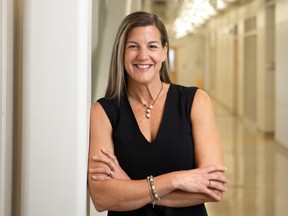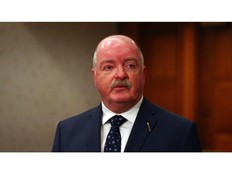UPDATE: NBCC defends massive increase in international students amid cap
The comments come as the Trudeau government announced plans to dramatically reduce the number of international student permits it issues

Article content
The head of New Brunswick Community College says the institution’s massive increase in international students is needed to train newcomers to fill the province’s vacant jobs, and has nothing to do with cashing in on higher tuition.
NBCC president and CEO Mary Butler says there’s no need to reduce the number of international student permits her school receives, suggesting it would only hurt the province’s economy in the years ahead.
The president of the Université de Moncton has also registered his displeasure, suggesting it will ultimately impact the growth of francophone New Brunswick, while warning of the financial impact to the institution’s bottom line.
“We’re experiencing labour shortages,” Butler said. “And we don’t have enough domestic population to address that.
“It’s incumbent on us to help train more people for the workforce.”
The comments come as the Trudeau government announced plans to dramatically reduce the number of international student permits it issues, with federal Immigration Minister Marc Miller stating New Brunswick will be one of the provinces most affected.
The feds say the move is necessary, maintaining that institutions are increasingly taking advantage of newcomers through high international student tuition, while putting further strain on the country’s housing crisis in the process.
NBCC admitted a total of 2,154 international students from 74 different countries in 2022-23, representing 17.5 per cent of its student population of 12,294.
It’s a number that has dramatically climbed in just a few years, while smashing the college’s own growth targets along the way.
Six years ago, the school had just 122 international students.
At that time, it set a goal to grow that number to 800 by 2022-23, and then went on to overshoot it by an extra 1,354.
Butler did say that labour force needs are only one component of the decision making behind bringing in more newcomers, and that a community’s “readiness” to absorb them also must be considered.
The school was recently forced to pull back.
Butler acknowledged that NBCC abruptly cancelled eight programs starting in January, citing a need to reduce enrolment. The college has instead offered those international students a full refund, or to defer study until fall 2024 or winter 2025.
“At NBCC we have had to make tough decisions about enrolment, not only to ensure institutional readiness, but community readiness,” Butler said.
“We had a larger-than-expected fall intake.
“As a result, we had to cancel some programs that were scheduled to run starting this month because we didn’t feel that community readiness, both internally with our college and with the larger community to absorb another influx of students.”
Butler said growth through both interprovincial migration and immigration has “put a lot of strain on our communities, not only housing, but food, health care, everything.”
But stunting growth isn’t the answer, she continued.
“A few years ago New Brunswick was at a critical moment,” Butler said, citing a province with the lowest education levels in the country and a dwindling labour force.
“There was a compelling argument for welcoming new people into post-secondary so they could weather those kinds of disruptions.”
The Higgs government’s current population growth strategy forecasted that between 2018 and 2027 about 120,000 jobs would become available in New Brunswick, while noting international students were necessary to “meet the targeted economic and labour market needs of the province.”
Butler also insisted that money isn’t behind the growth either.
Each international student pays $9,575 for a full year’s tuition, nearly three times the $3,420 domestic students pay for the same classes. That’s as a list of student fees also cost hundreds of dollars more for international students.
It’s dollars that pay to expand educational offerings, said Butler.
“If you look at our financial statements, you’ll see that we managed our finances very well, so our motivation was not about the bottom line, but the pipeline,” she said. “We’re focused on meeting the labour market needs of the province.”
NBCC’s influx of newcomers are part of the 11,410 international students the feds say New Brunswick welcomed in 2022. University of New Brunswick and l’Université de Moncton have also welcomed hundreds of additional international students in each of the last few years.
But the Trudeau government now wants to cap total new international student permits at 360,000 in 2024, handing them out to provinces on a per capita basis.
That means about 7,560 permits will be allocated to New Brunswick, thousands less than the latest annual total.
It’s a move the Higgs government is already pushing back on with Post-secondary Education, Training and Labour Minister Arlene Dunn stating that “these changes have the potential to hurt New Brunswick by wiping out recent enrolment growth at our colleges and universities, shrinking the labour market, and reducing the number of provincial immigration nominations.”
In a press conference on Tuesday, Université de Moncton president Denis Prud’homme said he is also “very concerned” with the announcement, while calling on the federal government to rethink the move or at least delay it beyond the next academic year.
Prud’homme said a cap will erode gains the school has made in growing its student population, which will in turn impact the growth of French-speaking New Brunswick and its economy.
He added that it will also harm the university financially.
“It would have a financial impact on any institution,” Prud’homme said, stating each institution will have to find ways to balance the budget. “In our case, about 65 per cent of our budget is from government grants and 35 per cent from student tuition.”
He suggested that raising the price of tuition would need to be considered.
Prud’homme rejected the idea that the Université de Moncton is taking advantage of international students for their tuition or contributing to a housing shortage.
“Certainly not,” he said. “The major problems that have been identified by the federal government are in Ontario and British Columbia.
“All of the institutions in New Brunswick have adopted a very ethical approach to increasing access to international students.”
He later added: “We should not associate the housing crisis with the increase in international students, I think it’s the lack of response from different governments.”
With a cap in place, the feds say it’s up to each provincial government to distribute its allocated number of international student permits among their designated learning institutions.
It means the Higgs government will be tasked with prioritizing who gets what, with the feds stating that every permit application it now receives will also require an attestation letter from a province.
Butler said she doesn’t expect the province to cut back the number of permits NBCC receives.
“Some key considerations for government in making the decisions are ‘what are priority sectors where we are having labour shortages and we need people?’ and ‘who’s delivering in terms of retaining graduates after they leave our institutions?’ she said.
“That’s where NBCC shines.”












Postmedia is committed to maintaining a lively but civil forum for discussion. Please keep comments relevant and respectful. Comments may take up to an hour to appear on the site. You will receive an email if there is a reply to your comment, an update to a thread you follow or if a user you follow comments. Visit our Community Guidelines for more information.